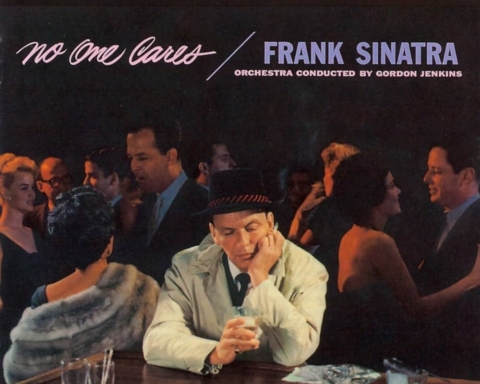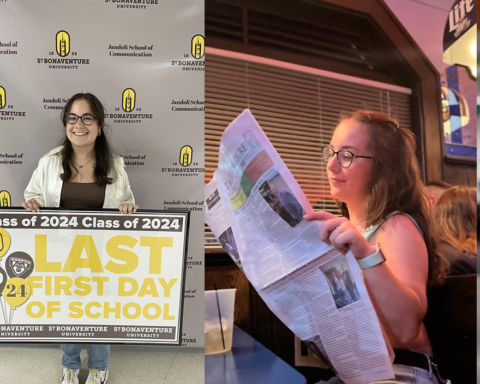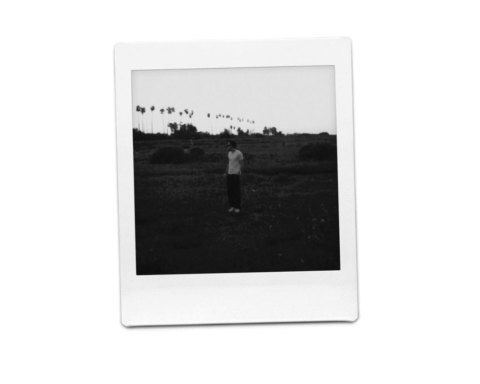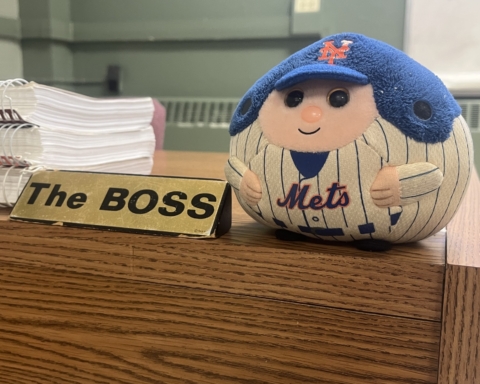NYC writer travels to ROTC Ranger Challenge for SBU-TV
Not expecting what’s next and getting out of your comfort zone when covering a story is part of the excitement and the experience that makes a young journalist become extraordinary.
I came to this realization over the weekend while covering the Ranger Challenge for St. Bonaventure’s Reserve Officers’ Training Corps. The event took place in Fort Dix, New Jersey, where it had dreary weather for two days straight and a few rain showers. A total of 46 schools, including Bonaventure, had ROTC cadets compete with cadets from other schools. All had the mission to endure mentally and physically tough courses to develop leadership while fostering teamwork.
When myself and my other SBU-TV reporter, Roisin Coleman, stepped foot on Fort Dix, I had a lot of mixed emotions and thoughts going through my mind because it was a different setting to be in. The setting felt extremely serious and intimidating.
The area had a plain view with just grass and trees. Hearing shots being fired from afar made me think I was in some kind of warzone. I had second thoughts about what I got myself into. However, I told myself to just go with the flow and go through it.
Coleman and I, being the only young journalists there, followed the ROTC cadets to capture their experiences at the Ranger Challenge. I felt a bit timid because of so many eyeballs staring at every move Coleman and I made when covering the action. I wasn’t used to having so many stares when I record a story.
Ultimately, I became used to the stares and just continued doing what I was doing. Carrying the camera bag along with the tripod from one destination to the other got extremely tiring and annoying. Although at some moments I had the chance to take the van, it was tiring taking the camera out of the bag when an action moment came up, putting it back, then retaking it out and placing it on the tripod. Those moments taught me to act urgently when capturing the moment.
As it began to head into the night, Coleman and I were given a tent to set up. Being a woman that was born and raised in New York City, I had no type of knowledge on how to set up a tent or even being comfortable sleeping in one. Sgt. Nicholas S. Miller, military science instructor at St. Bonaventure, helped us set up the tent, and I personally didn’t find it challenging.
Afterwards, we set up our cozy sleeping bags in the tent and prepared to get the rest we needed before waking up in four hours for more coverage of the challenge.
At some point during the night, I started hearing helicopters and the tree branches making noise, and a few moments later, heavy rain started pouring down on all of us.
I said to myself, “Come on!” I became extremely furious, but then I took a moment and realized I should stop being frustrated about what I was going through in that moment, since the ROTC cadets weren’t sleeping in tents. They were all sleeping in their sleeping bags with a thin poncho covering them.
Coleman and I woke up at exactly 3:46 a.m., since we had to be up and ready with the cadets to record their next tasks. The drizzling rain and the chilly weather made my mood a little worse, since I barely got enough sleep. My body seemed to crash down. We’d been outside all day and night, and dragging the camera and tripod along the way made everything seem so exhausting.
Overall, I continued with the drive, capturing the moments and getting the story done. I’ve had a bit of a taste of what the ROTC cadets go through, and I’m glad I’ve experienced and captured the entire moment.
What Coleman and I have gone through was certainly out of our comfort zone. Not having access to a shower, barely getting any sleep, being quick on your feet and following along the determined cadets were all part of learning, changing and being more excellent as a journalist.
Therefore, I suggest all journalists should get out of their comfort zone at some point in their career, get their hands dirty and just go through the journey that would ultimately make them build the extraordinary character that’s hidden.
By Yoselin Person, Staff Writer
personyr16@bonaventure.edu






